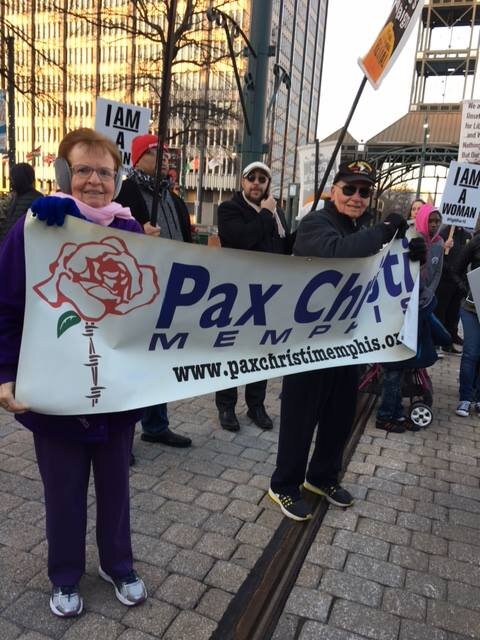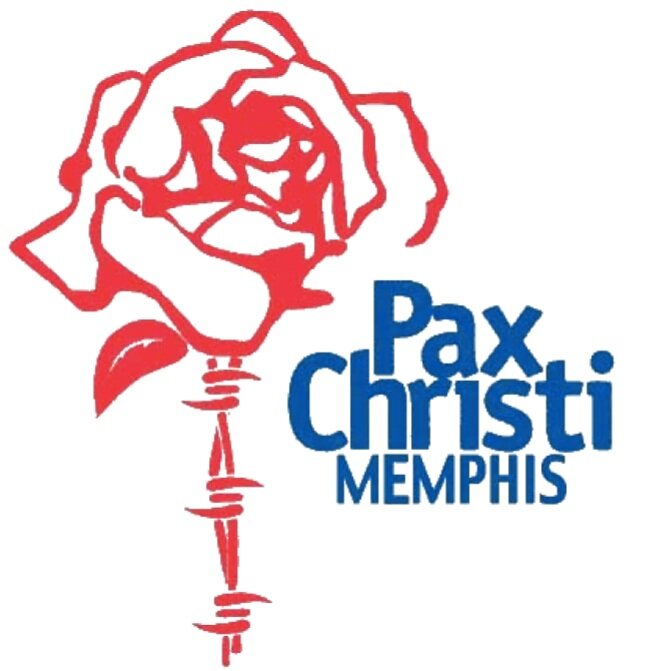
We must lock away the Just War Theory in the same drawer as the Flat Earth Theory.
— Bishop Carroll Dozier
Pax Christi National Assembly
Rochester, MN 1982
About
In 1973, Pax Christi was beginning in the United States, Memphis's Bishop Carroll Dozier was asked to join with Bishop Thomas Gumbleton of Detroit as Episcopal Moderators of the organization. When he had been a theology student in Rome in the 1930s, Bishop Dozier had seen the rise of fascism under Mussolini and Hitler. He became aware of the need for an active Catholic peace movement. None had existed in the Church since perhaps the Middle Ages. Now, as a bishop, he was able to help bring about such a movement in the United States. Bishop Dozier remained active in Pax Christi until his death.
Bishop Dozier + Beginnings…
Although he was unable to attend Pax Christi's founding assembly in Washington in 1973, he sent two professors at Christian Brothers College in his place --Dave Thomasma and Gerry Vanderhaar.
Because of Bishop Dozier's national involvement in Pax Christi, that organization became the vehicle for the peace movement in Memphis. Early members in Memphis included people of all faiths, not just Catholics. Their efforts for peace came from a sound spiritual basis.
To call attention to the need for nuclear disarmament, Memphis Pax Christi members began a yearly Hiroshima Day vigil. We have sponsored Memorial Day services to commemorate those who have died in war and to pray that such deaths will not happen again. Each year we try to have a Peace Retreat, a special day of prayer and reflection led by someone of national reputation.
—Gerry Vanderhaar
The first members in the United States were several dozen Catholics on the East Coast, inspired by Dorothy Day of the Catholic Worker movement, led by Eileen Egan, who worked for Catholic Relief Services, and Gordon Zahn, who taught at the University of Massachusetts. The urgency, in the early 1970s, was ending the war in Vietnam. But their intention was broader—
Pax Christi USA
to appeal to a wide range of Catholics, not just pacifists, in carrying out the peace teachings of Vatican II and of Popes John XXIII and Paul VI. Pax Christi USA adopted five priorities for its peace work: Disarmament, Alternatives to
Violence, Peace Education, Primacy of Conscience, and a Just World Order. In view of the persisting nuclear threat, disarmament was felt to be the most pressing priority. But the memory of Martin Luther King and the pacifist inspiration of Dorothy Day led Pax Christi to explore alternatives to violence as its special contribution to the church in the United States.
VOW OF NONVIOLENCE
RECOGNIZING THE VIOLENCE IN MY OWN HEART, yet trusting in the goodness and mercy of God,
I vow for one year to practice the nonviolence of Jesus who taught us in the Sermon on the Mount:
Blessed are the peacemakers, for they shall be called the sons and daughters of God...
You have learned how it was said, "You must love your neighbor and hate your enemy";
but I say to you, "Love your enemies, and pray for those who persecute you.
In this way, you will be daughters and sons of your Creator in heaven."
Before God the Creator and the Sanctifying Spirit, I vow to carry out in my life the love and example of Jesus
by striving for peace within myself and seeking to be a peacemaker in my daily life;
by accepting suffering rather than inflicting it;
by refusing to retaliate in the face of provocation and violence;
by persevering in nonviolence of tongue and heart;
by living conscientiously and simply so that I do not deprive others of the means to live;
by actively resisting evil and working nonviolently to abolish war and the causes of war from my own heart and from the face of the earth.
God, I trust in Your sustaining love and believe that just as You gave me the grace and desire to offer this, so You will also bestow abundant grace to fulfill it.
